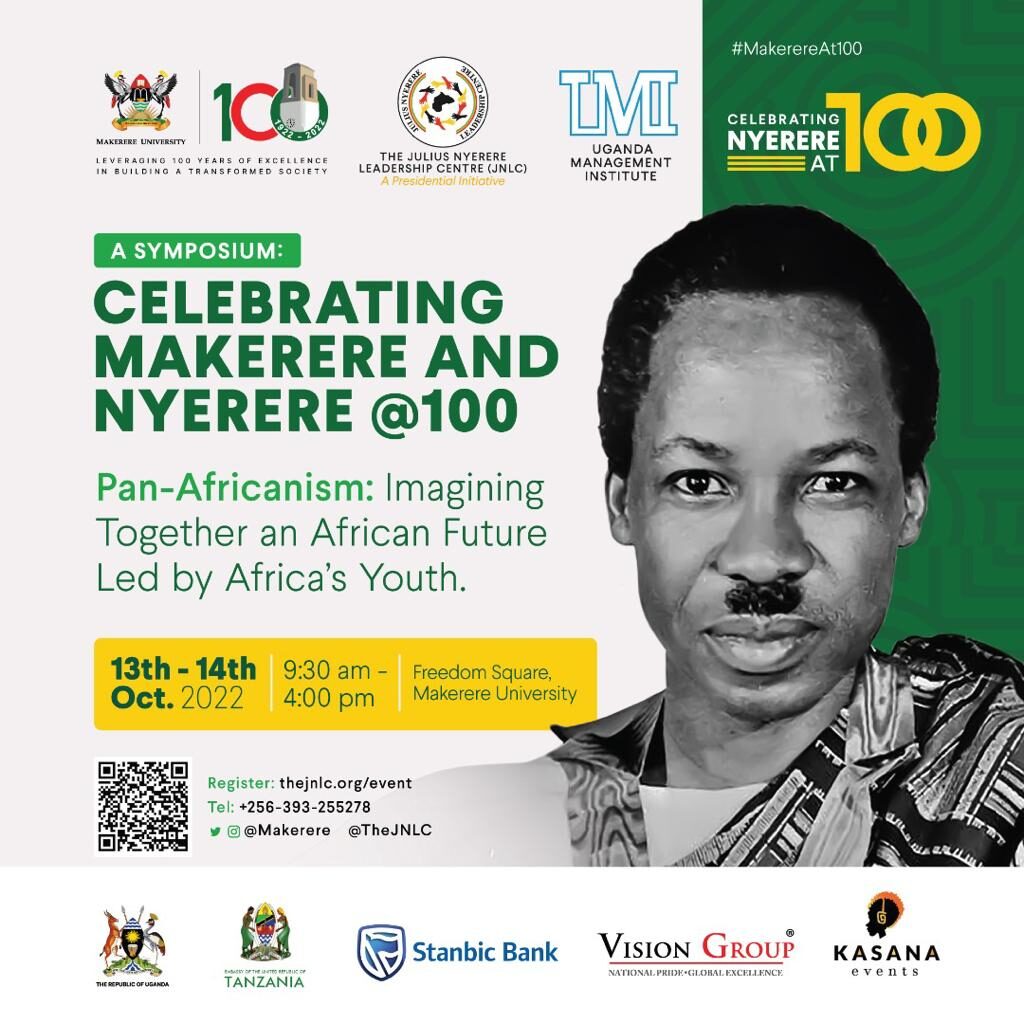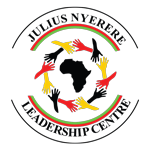
A Symposium: Celebrating Makerere and Nyerere@100
THEME
“Imagining together an African Future led by Africa’s Youth.”
12th - 14th
October 2022
9am - 5pm
12th -14th Oct
Freedom Square
Makerere University

Download a copy of the detailed Abstract and Programme of the Symposium: Celebrating Makerere and Nyerere@100

Abstract – 2022 Nyerere Symposium
“We, in Africa, have no more need of being ‘converted’ to socialism than we have of being ‘taught’ democracy. Both are rooted in our past — in the traditional society which produced us. “Julius Kambarage Nyerere, 1967.
Africa’s youth population is rapidly growing and expected to double by 2050. Many have argued that this is a dividend that if properly harnessed can have a positive impact on the continent’s socio-economic development. A large young population means an increase in the working age population with an ability to support increased productivity and stronger, more inclusive economic development across the continent.
This positive depiction of the Africa’s youth bulge notwithstanding, there are those who question the ability of the youth to move beyond idealism, hopes, and dreams for the future to actually working towards finding solutions to the multifaced socio-economic problems that the continent faces. The caveat to the youth’s ability to carry on the mantle left by the legacy of past leaders such as Kwame Nkurumah, Nelson Mandela, Julius Nyerere are the skill sets available to the youth beyond a technical education.
Both the positive and negative view of the youth in Africa raise important questions about their connection with its history and their sense of identity. For example, what does it mean to be an African? Do the youth today have a clear understanding about the relationship between this identity and their history? What was the vision of early generation Pan-Africanists about the continent, its history and the relationship with their identity? To what extent do Africa’s young appreciate and understand their history and the context of their identity? Is this understanding and appreciation of Africanness coupled with the requisite skills as well as a readiness to serve and lead? If one accepts Mwalimu Nyerere’s view that leaders are made not born and that in each and every one of us is the ability to lead then the question becomes about the skill sets needed to turn potential into a lasting leadership where the young emerging leaders are sufficiently empowered and skilled to take the continent forward.
These questions and debates form the basis for the Symposium to celebrate both Makerere University@100 and also one of its most prominent alumni and a Pan-Africanist Mwalimu Nyerere@100.
Makerere University@100 with its rich history and forward-thinking reforms provides the best forum to hold the Symposium. Makerere has educated many of Africa’s leaders including Mwalimu Nyerere. As the University celebrates 100 years of existence and dedicated knowledge production, this coincides with Mwalimu Nyerere @100. An alumnus of Makerere University, Mwalimu Nyerere made it clear during a speech at the opening of the University of Zambia that universities hold a special place in generating new knowledge but above all for spreading the pan-African ideals. “I believe that the members of this university, and of other universities in Africa, have a responsibility in this matter (dilemma facing the Pan-Africanist)”
He prompted his audience by asking “Who is to keep us active in the struggle to convert nationalism to Pan-Africanism if it is not the staffs and students of our universities? Who is it who will have the time and ability to think out the practical problems of achieving this goal of unification if it is not those who have an opportunity to think and learn without direct responsibility for day-to-day affairs?”
At the time Mwalimu Nyerere proposed that universities move in the direction of African unity through the exchange of students, the sharing of expertise on particular subjects, and even share certain services. In his view Unity and Pan-Africanism were not just the work of governments and he urged universities to put proposals before Governments and then demand from politicians a reasoned answer on the basis of African unity.
The Symposium – Structure, Participants and Audience
The two-day Symposium scheduled for October 12th -14th 2022 will bring together 300 delegates, a cross-section of established and emerging leaders drawn from public and private sectors from across the region with a common interest – imagining an African future led by Africa’s young population. The symposium activities will include interactive leadership dialogues, exciting cultural activities, inter-generational conversations on the practical leadership and technical skills needed to secure a more self-reliant continental youth-led political and development agenda as well as action-planning and agenda setting. It is expected that the inter-generational conversations will illicit bold ideas from the young and emerging leaders on the leaderships Africa needs as well as an envisioned youth-led Pan-Africanist agenda designed to effectively meet the challenges of a complex global future.
The cultural engagements at the symposium, including Music, Art and Fashion are also designed to celebrate our history, culture and identity as Africans.


